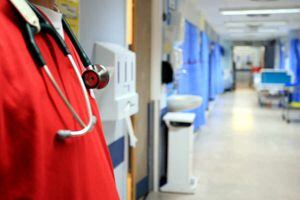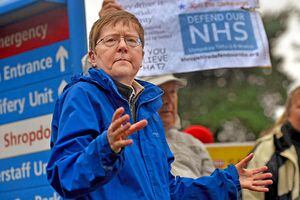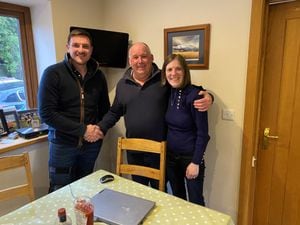Shropshire hospital crisis: Report paints picture of hospitals creaking
It paints a picture of hospitals creaking under the pressure of patient numbers and staff shortages.

A report has revealed the cost people in need of medical treatment are having to pay.
The problems experienced by the under pressure A&E services at Royal Shrewsbury Hospital and Telford's Princess Royal Hospital have been well documented.
But today it is revealed that other services patients take for granted are now being affected.
The report details the impact of staff shortages on a number of departments at the two hospitals.
Hospital bosses say they are looking at the long-term sustainability of all of their services to ensure that they can provide the best care for patients both now and in the future.
But in the short term there are number of difficulties being faced by health professionals, which impact on services.
It starts by outlining the issues currently facing the trust's ophthalmology service.
The paper says: "The service remains closed to new referrals for glaucoma, general surgery and adult surgical squint surgery. Due to short notice sickness the trust is unable to offer glaucoma surgery. Alternative providers have been sought for 12 patients waiting for surgery."
The closure of some eye treatment came after health chiefs raised concerns over eye treatment at the county's main hospitals after two "serious incidents" in just a matter of weeks in the department.
The paper states the trust is currently working on plans for the preferred option for long term sustainability of the service.
It also details issues about the neurology outpatient service, which will be temporary closed to all new referrals for a six month period from March 20. Neurology deals with diseases of the nervous system. This includes the brain, spinal cord, nerve, muscle and their connections.
The report says: "The service has consistently been flagged to commissioners and NHS Improvement as being a particularly challenged speciality with constraints in delivering national access targets due to consultant workforce gaps.
"Currently SATH employs two consultant neurologists. This is supported by one locum post. The national average is one neurologist per 80,000 people. This would equate to six neurologists for our local population. Despite our best efforts, we are unable to secure additional locum capacity to fill the gap. This workforce position has led to increasing delays in patients waiting to be seen. On average, new routine patients are waiting 30 weeks for their first appointment and nine weeks for an urgent referral.
"In order to deliver the national standard it should be seven to nine weeks for routine patients and two to four weeks for urgent referrals. Clearly there is a potential risk to patients."
The paper says health bosses have undertaken a series of actions to reduce patient risk. But it says SATH has formally advised commissioners of their intention to temporary close the neurology outpatient service to all new referrals for a six month period from March 20.
The report says: "All current patients on the waiting list will be seen with an expected reduction in waiting times from 30 weeks to 12 weeks within three months."
The next area facing difficulties is dermatology outpatients.
The report says: "The service's locum consultant resigned on the week starting February 22 with immediate effect, leaving one consultant
"A single consultant led service is not viable due to the need for all cancer two week referrals to be supervised by a consultant. Failure to appoint a consultant will leave the service in a very fragile position."
Finally there are also details about staffing issues with the hospital's spinal service.
The paper says SATH has one consultant who specialises in spinal surgery, who went on long term sick with no notice. The trust has said it currently cannot take referrals for spinal problems and is in discussions with the Robert Jones and Agnes Hunt Orthopaedic Hospital NHS Foundation Trust regarding their capacity to support this service for the county.
An extraordinary crisis in our NHS

Hospital campaigners today described the crisis facing Shropshire's hospitals as "extraordinary".
Gill George, chairwoman of Shropshire Defend Our NHS, said there needed to be a fundamental review of the way hospitals are run in our county.
She said: "The hospital bosses claim that the latest health reforms are about 'care closer to home' – but this extraordinary document shows the opposite.
"There is a massive risk here of vital services being stripped out of Shropshire altogether.
"There are two problems here. One is the huge financial crisis, which is leading to NHS cuts through the sustainability and transformation plan.
"Cuts on this scale will devastate hospital provision in Shropshire, and it is no wonder SaTH cannot recruit. Closing an A&E is just going to make things worse.
"But the other problem is one that hospital managers urgently need to get to grips with.
"Good practice is that you start from the services that patients need, and then you work collaboratively with other organisations to provide those services.
"That is why almost every small to medium sized hospital trust works with other hospitals, to share medical staff, and to provide specialist services in a cost-effective way where patients need them.
"We have to start doing that locally. Sath has got itself very stuck in a kind of 'empire building' mode, and they always insist they have to go it alone.
"It is daft, and they are letting down their patients badly. They are living in the past.
"The world has moved on, and they have got some catching up to do."
Sara Biffen, deputy chief operating officer at The Shrewsbury and Telford Hospital NHS Trust, said "long-term sustainability" was the priority.
She added: "We have said repeatedly that if we do not change the way we run our hospitals, services could be lost to centres out of the county.
"Creating a single emergency department – supported by two centres which will provide accident and urgent services for the majority of people who currently attend our two A&Es – will help us to provide the best specialist care to our patients. It will also help us to recruit the best people for these specialities. But we are also looking at other services also facing the fragility that is being felt by many other acute trusts around the country."
She said discussions were ongoing to identify how problems outlined in the document can be solved so that patients are not adversely affected, including meeting with the Clinical Commissioning Groups for Shropshire and Telford & Wrekin, together with Powys Teaching Health Board.





